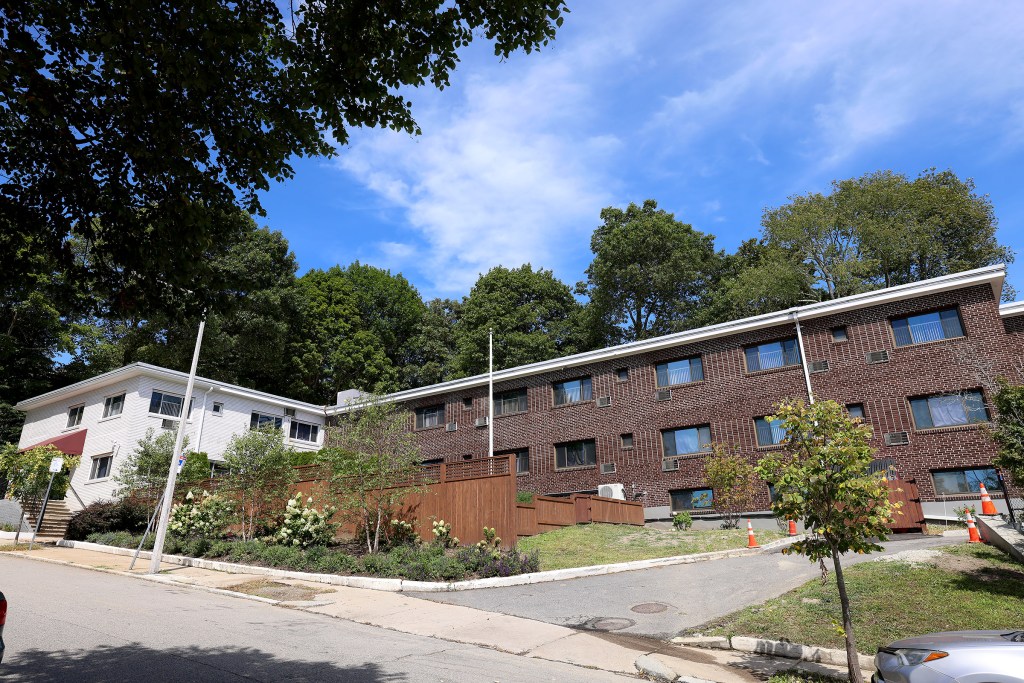A group of West Roxbury residents opposed to a planned homeless shelter for families and migrants, largely due to safety concerns, has been denied a restraining order that it sought in court to block the project.
Suffolk Superior Judge John Fraser has determined that the neighbors’ complaint over the controversial facility at 5 Redlands Road had little chance of succeeding, ruling that the plaintiffs “failed to establish likelihood of success.”
Stephen Marsh, a resident who directly abuts the property, led the push for a temporary restraining order and injunctive relief alongside five neighbors and a nearby restaurant. The group filed the motion in court immediately after the Zoning Board of Appeals upheld the city permit for the project on Oct. 28.
The ZBA’s denial of Marsh’s appeal and the court’s rejection of his request for injunctive relief clear the way for a state contractor to convert a former nursing home into a homeless shelter for families and migrants.
“Based on the Court’s review of the submissions of the parties at this very early juncture of this case,” Fraser wrote in his court ruling earlier this week, “the lack of a written decision from the Board, and the deference to which the Board is entitled, the Plaintiffs have failed to establish likelihood of success and are not entitled to injunctive relief.
“Given the lack of likelihood of success,” Fraser added, “the Court need not and does not address the other arguments asserted by the defendants in their opposition papers.”
Similar to Marsh’s appeal to the ZBA, the plaintiffs behind the court complaint argued that the planned use for the facility is misclassified as “congregate living” when they believe the actual use is “homeless shelter/transitional living,” which would require conditional use approval by the ZBA.
The neighbors argued that the permit was issued in error and that the project violates the site’s current zoning.
State officials are looking for the facility to house up to 42 families, which a representative for the contractor, Making Opportunity Count, has put at upwards of 150 to 175 people.
The planned facility would be part of the state’s Emergency Assistance Family Shelter program, which has been strained in recent years from the arrival of migrants seeking refuge from dangerous conditions in their home countries.
“This site is not adding new capacity to the system, but is part of the Commonwealth’s strategic shift to transition away from hotels and ensure stable shelter options for families experiencing homelessness,” an informational sheet from the state contractor reads.
Representatives from Making Opportunity Count have said the facility would be congregate living because families would be residing at the site for at least 31 days and up to six months, with the option to seek an extension.
A shelter or transitional living use pertains to stays of 30 days or less, Paul Rufo, an attorney for the developer, told the board last month.
In the court complaint, the plaintiff’s attorneys, Andrew Goloboy and Kevin Cloutier, highlighted how the neighbors believe the conversion “increases risks to their safety” and will “adversely affect the value of their respective properties.”
The attorneys pointed to the results of a month-long investigation that former Boston Police Commissioner Ed Davis conducted last winter into security in shelters housing migrants and local families.
The study done by Davis’ company, which inked a $175,000 contract with the state to write a report and help implement recommendations, found that safety policies were inconsistent, security presence at sites varied “significantly,” and a lack of coordination between state officials, providers, and police hindered the ability to share information about residents’ backgrounds.
“Mr. Davis’ report found a 788% increase in security-related incidents across the state’s EA shelter program during 2022-2024,” the attorneys wrote in the complaint. “These incidents included domestic violence, sexual assault/abuse, child abuse/neglect, inter-shelter fights and conflicts, health emergencies requiring EMS response, police calls, resident deaths, and fires.”
